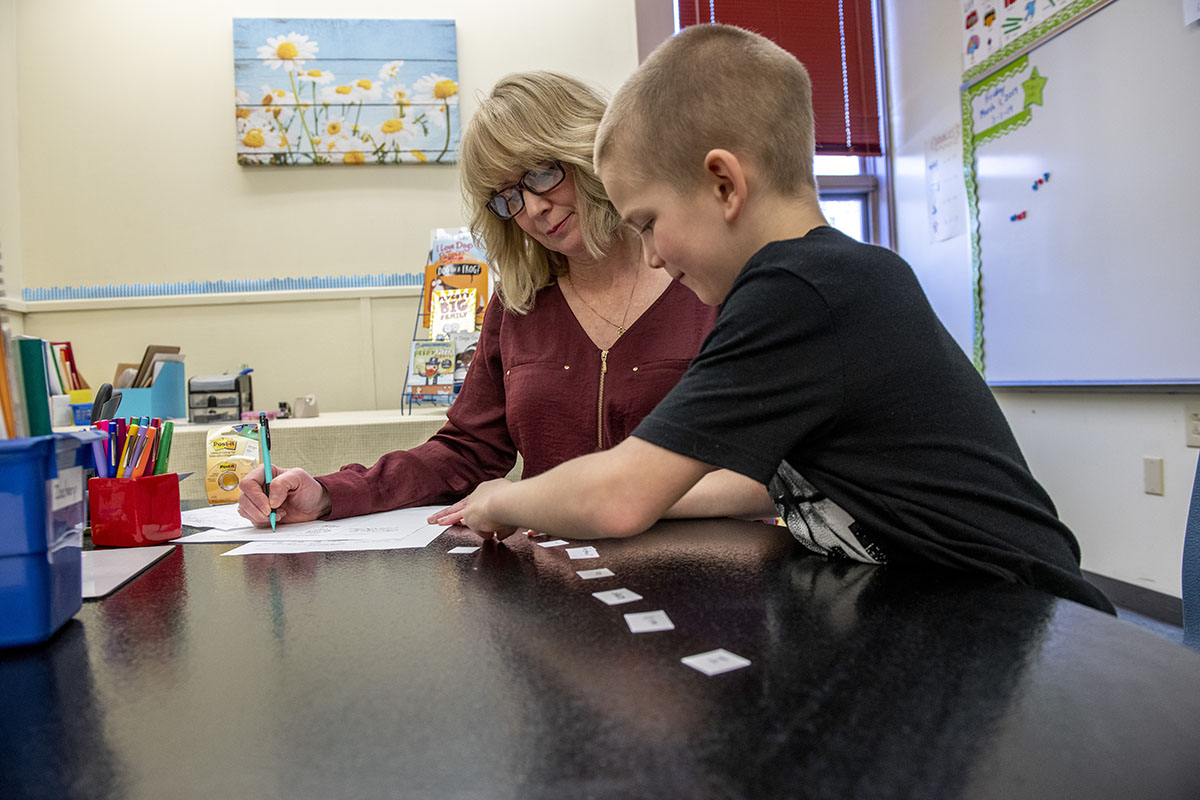
Maine Schools in Focus: Partnering with School Systems to Support Teacher Expertise in Literacy Instruction and Intervention
Lori L. Taylor, Ph.D., University of Maine
Reading Recovery Trainer of Teacher Leaders
“The good news is that a teacher can prevent or reverse students’ reading failure. Research shows that the teacher—not methods or programs—is the most important factor in a student’s reading success” (Dorn & Jones, 2012, p. 5). These words encapsulate the overarching goals of the University Training Center (UTC) for Reading Recovery® and Comprehensive Literacy, a professional development unit embedded within the literacy program in the School of Learning and Teaching in the College of Education and Human Development at the University of Maine. The UTC supports schools in systemic implementation of effective literacy instruction and intervention for children in Maine schools through high quality professional development for teachers.
The University Training Center for Reading Recovery was established in 1993-1994 and has expanded to include a Comprehensive Intervention Model (CIM) for grades K-12 as well as Maine Partnerships in Comprehensive Literacy (MPCL), a model for school improvement targeting classroom instruction. Each initiative follows a train-the-trainer paradigm following Marie Clay’s Reading Recovery model (Gaffney & Askew, 1999), in which university trainers provide initial training and ongoing professional development for teacher leaders and literacy coaches. Teacher leaders and coaches then provide initial and ongoing training for teachers in schools. Districts and schools partner with university trainers, literacy coaches and teacher leaders in ongoing efforts to develop systems of comprehensive literacy for children, by supporting teacher expertise.
Experts on the topic (Darling-Hammond, Hyler & Gardner, 2017) describe high quality professional development as content-focused, collaborative, job-embedded reflective practice that includes ongoing expert support. Improved practice in teaching is an ongoing process, “renewed through continued work with students and ongoing professional development” (Lyons, Pinnell & DeFord, 1993, p. 180). The University Training Center currently partners with 128 schools in 62 school systems across the state of Maine investing in teacher professional development for systemic improvement in student outcomes. The ongoing goal of the UTC is to offer trainings for teachers that incorporate the elements of effective professional development.
A recent study exploring the relationship of offerings by the University Training Center for Reading Recovery and Comprehensive Literacy with teacher professional development in Maine, reported that teachers value high quality professional development, especially when offered on-site in schools and embedded in their daily work. Also of importance to the practitioners partnering with the UTC is the opportunity for networking, collaborating, and learning from and with colleagues (Taylor, 2018). Studying theory and research, and working together to apply new learning to practice (Elmore, 2004; Garrison, Anderson & Archer, 2010) within and across schools and districts is critical to ongoing support for teaching, and for meeting the needs of every student.
Systemic school improvement efforts, such as the Comprehensive Literacy Model of the UTC, require cohesive goals and curriculum, coordinated, sustained efforts among administration and teaching staff, and congruency between general classroom instruction and intervention supports. School/university partnerships, including in-house literacy coaches and site-based teacher leaders, can help to build collaborative learning communities that develop expertise among all teachers and improve student literacy. In fact, student achievement in reading and writing has been shown to increase as early as the first year of implementation of a comprehensive literacy model (Biancarosa, Bryk, & Dexter, 2010; Dorn, Forbes, Poparad, & Schubert, 2015, Chapter 15).
Maine school systems are encouraged to think critically about a comprehensive design for sustainable processes that support ongoing professional development for all teachers. A cohesive and comprehensive model includes powerful classroom instruction along with a broad range of literacy interventions, providing multiple layers of differentiated instruction for all learners. In considering a comprehensive literacy model, here are some questions to consider:
- Does your school or district engage in a comprehensive literacy system that embeds levels and layers of intervention within high quality classroom instruction?
- Are all teachers provided intensive professional development and ongoing in-school support from knowledgeable persons in literacy theory and practice?
- Do all teachers have scheduled opportunity to collaborate with colleagues to build expertise?
Information about the University Training Center for Reading Recovery and Comprehensive Literacy can be found at our website: umaine.edu/maineliteracy.
References
Biancarosa, G., Bryk, A., & Dexter, E. (2010). Assessing the value-added effects of Literacy Collaborative professional development on student learning. Elementary School Journal, 111((1), 7-34.
Darling-Hammond, L., Hyler, M. E., & Gardner, M. (2017). Effective teacher professional development. Palo Alto, CA: Learning Policy Institute.
Dorn, L. J., Forbes, S., Poparad, M. A., & Schubert, B. (Eds.). (2015). Changing minds, changing schools, changing systems: A comprehensive literacy design for school improvement. Los Angeles, CA: Hameray Publishing Group.
Dorn, L. J., & Jones, T. (2012). Apprenticeship in literacy: Transitions in reading and writing (2nd ed.). Portland, ME: Stenhouse.
Elmore, R. F. (2004). School reform from the inside out: Policy, practice, and performance. Cambridge, MA: Harvard Education Press.
Gaffney, J. S., & Askew, B. J. (Eds.). (1999). Stirring the waters: The influence of Marie Clay. Portsmouth, NH: Heinemann.
Garrison, D. R., Anderson, T., & Archer, W. (2010). The first decade of community of inquiry Framework: A retrospective. Internet and Higher Education (13), 5-9.
doi: 10.1016/j.iheduc.2009.10.003
Lyons, C. A., Pinnell, G. S., & DeFord, D. E. (1993). Partners in learning: Teachers and children in Reading Recovery. New York: Teachers College Press.
Taylor, L. L. (2018). Exploring the relationship between University Training Center for Reading Recovery and Comprehensive Literacy offerings and teacher professional development. (Research Study Report). Orono: University of Maine.
Any opinions, conclusions, or recommendations expressed in the Maine Schools in Focus briefs are those of the authors and do not necessarily reflect institutional positions or views of the College of Education and Human Development or the University of Maine.
